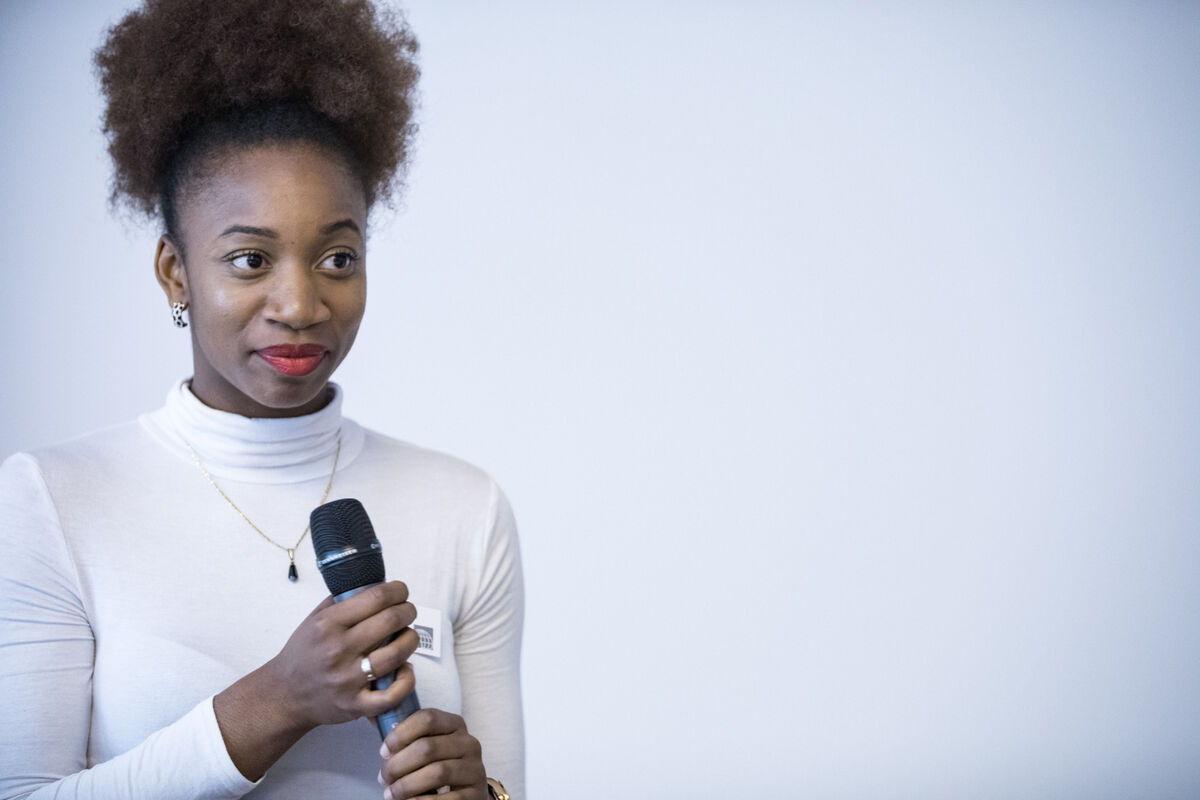- Austausch & Vernetzung
- Wissen & Lernen
- Advocacy
- Unsere Themen
Von Margaret Daramola
Poetry has power. There is power in the words you speak out. There is an unexplainable force that comes to existence when words are being brought to life. How much more efficient would it be when that power is being used for change? How beautiful is it to use the primary tools life gives us in order to make a difference? When we involve creativity and passion into our daily tasks we improve the results thereof.

There are certain things that can only be felt, and it can be quite difficult to put words on them. Especially if it involves a memory that is attached to a traumatic experience.
This is where art comes into the picture. It not only serves as means of expressing unspoken feelings, it can also be useful in political fields.
Policy makers, international civil servants and professionals need to be sensitized afresh to the task on which they are working. Sometimes it can be challenging to remember the reasons why we started a certain job or took a particular career path. This is because regularly, we work afar from the local problem. Our work is thus very theoretical and is no longer concrete. Art has the ability of reviving certain emotions. It therefore enables us to reconnect with the source of our work. Especially if we do not work on the spot.
In some cases, we can be so used to sensitive images that they no longer serve their purpose. Our minds have been programed to protect itself from reacting the same way to touching images. Therefore, they can lack their efficiency if we are used to seeing them.
This is where slam poetry takes the wheel. When it comes to basic human rights, or more precisely sexual and reproductive health and rights, spoken word poetry plays a huge role in breaking the taboos around sexuality. When it involves a victim, slam poetry has the power of bringing to surface the feelings that have been long suppressed due to the culture of silence around sexual rights.
In essence, after listening to a performed poem such as this one. It is easier for us to put ourselves in the shoes of the victim. This is crucial part for policy makers and non-profit organizations. Art engages with our spirit, therefore, our passion for our work is revived.
Isn’t that what we desire? Isn’t that what we need? To be as close as possible to the people we want to help, even when we cannot be there with them physically?
Using poetry, or any form of art, is a great way to start, by doing so we can easily bring people with us in our fight for social justice. It enables us to spread more awareness on our subject matter.
As a young activist, I am aware that the work goes beyond art. The task is indeed bigger than that. However it is only after we have efficiently sensitized our target audience that we can then involve them in our activism.
Barbara Miller recently produced a film entitled #Female Pleasure, in which she addresses the issues around female sexuality. She uses art as a primary tool to pass forth her message. Five different women from completely different places in the world, yet they all go through the same form of injustice. This film is so empowering and touching because we follow these women in their everyday lives, we follow their emotions and we become attached to the protagonists. By making this type of documentary Barbara miller opens the door for empathy to come in, we are thus motivated to engage in activism.
There is also the example of Waris Dirie’s autobiography « Desert Flower » which refers to the difficulties of growing up as a female in Sub-Saharan Africa. She writes about how she went from being a victim of female genital mutilation (FGM) to fighting against it. By writing this book and making a movie thereof, Waris Dirie has been able to bring many people with her in her journey. She is the reason why many individuals take part in the fight for human rights. In this case, it all started with a book.
As for myself, I recently began a project with the vision of reducing the rate of female genital mutilation in Nigeria and spreading awareness on the topic in Switzerland.

FGM involves over 200 million women across the globe and Nigeria has one of the highest rates. This practice is done in the name of tradition and the whole point there of is to control female sexuality.
Cutting a child in this way, whatever the motives may be, is considered child abuse. The side effects are horrible. They involve pain, nightmares, sterility, lack of pleasure during sex and of course all the side effects of trauma.
The aim of my project is to educate the practitioners on the dangers involved in this practice. If their will is truly to protect young girls, then there are better ways to do so. And obviously, present those ways. Indeed, I plan on taking the arts with me along, I plan on making it my best friend as I navigate the rivers of the unknown. As I look for a land of hope and a brighter future for the lives of all humans, I do plan on taking the arts along.